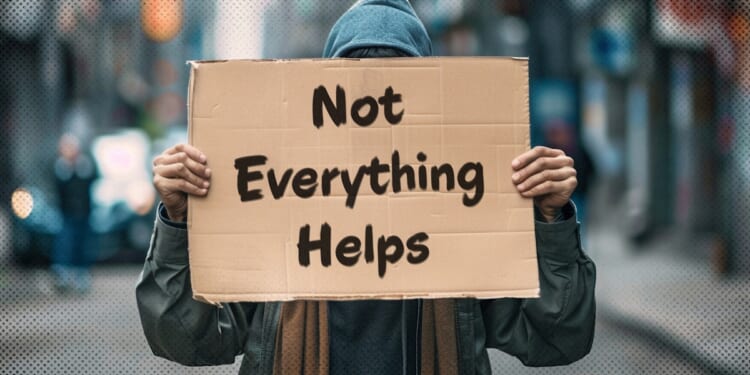As is the case for pretty much every corruption charge levied at Democrats, their initial response is, “Oh, no, that’s not happening!” That’s where we are in this latest kerfuffle — what Democrats label a “right-wing conspiracy” about Antifa stealing money from homelessness nonprofits. Well, if we’ve learned anything from all the Soros-backed nonprofits funding Antifa, as well as many other Democrat organizations, or from USAID funding a whole host of anti-American affairs, it’s that it in fact does happen.
Cue the “Homeless Industrial Complex” that uses your hard-earned tax money that’s supposed to “combat homelessness” to support political activism instead. A report by the Capital Research Center reveals the vast network of nonprofit organizations, legal activists, and ideological entrepreneurs that has built a sophisticated structure around homelessness. Groups like the Southern Poverty Law Center, the National Homelessness Law Center, the Western Regional Advocacy Project, and the National Low Income Housing Coalition have all made themselves appear to be helping with the homelessness problem, when in fact they are perpetuating it.
“Fringe groups in the Homeless Industrial Complex like to characterize homelessness as a symptom of societal injustices, such as systemic racism, police violence, or capitalism,” said Scott Walter, president of the Capital Research Center. When you have groups like the SPLC and other allies accuse Trump of “human rights violations” for signing an executive order to address the root causes of homelessness, then you know something’s off. Isn’t that something they claimed they wanted to fix? SPLC Deputy Legal Director Kirsten Anderson went so far as to accuse Trump of “resurrecting unlawful and outdated approaches to housing that are rooted in racist stereotypes and bias against people with disabilities.”
Her statement reveals that part of the issue is the ideologies these organizations have bought into. They advocate for “housing first,” the idea that housing programs should accept people regardless of their drug use status; “harm reduction,” the idea that housing programs cannot prevent drug use and therefore should normalize it; or “housing justice,” the amalgamation of left-wing activist causes on race, transgender ideology, and other housing issues. The biggest problem is that these organizations believe people have a “right” to housing instead of having to earn it.
Walter correctly points out that they are treating “homeless people as pawns in ideological wars.”
Another striking example of the paradox is the lawsuit that these groups filed when the city of Grants Pass, Oregon, attempted to clean up its streets. Local leaders sought to enforce basic rules prohibiting public camping. The city was unfairly portrayed as just wanting to sweep encampments off the streets, although they should be able to do that for public safety at the very least. Yet the city had prepared shelter facilities offering a humane alternative to life on the sidewalk and was ready to establish a system of accountability and compassion. But the advocacy groups intervened, filing lawsuits that eventually reached the Supreme Court. More than 750 organizations filed amicus briefs in the Supreme Court case arguing that laws against camping on the sidewalk violate the Eighth Amendment prohibition on “cruel and unusual punishment.” Thankfully, the justices disagreed, but this exposes the massive problem of nonprofits exacerbating the homelessness crisis.
The Capital Research Center’s report not only follows the money but also highlights the fact that “the Homeless Industrial Complex has ties to groups that celebrated the Oct. 7, 2023, Hamas terrorist attacks, along with connections to the Black Lives Matter movement and Antifa anarchists.” This confirms the pattern we have seen of the ideological capture of corporations, institutions, universities, and government bureaucracies. When real results are replaced with ideological victory, then not only do the homeless suffer, but ordinary citizens do as well.
“Bad actors in the Homeless Industrial Complex appear to be spending taxpayer dollars on everything but real solutions to America’s homelessness crisis,” Walter explained. “The result is a self-serving cycle that wastes government funding, alienates potential allies in the fight against homelessness, and leaves vulnerable people without the direct services they need.”
The true interest these groups have in “helping” the homeless is not compassion or solving a problem; it’s ensuring the spigots stay open to keep funding flowing into activism to maintain power.
As Christopher Rufo opined, “Homelessness is not an unsolvable problem. It is a problem that requires courage, clarity, and the willingness to challenge entrenched interests. The path forward is not to double down on the failed experiments of the past four decades, but to reclaim the principles of order, accountability, and genuine compassion that can restore both dignity to the homeless and safety to our communities.”
A Ronald Reagan proverb sums it up best: “I believe the best social program is a job.”
















